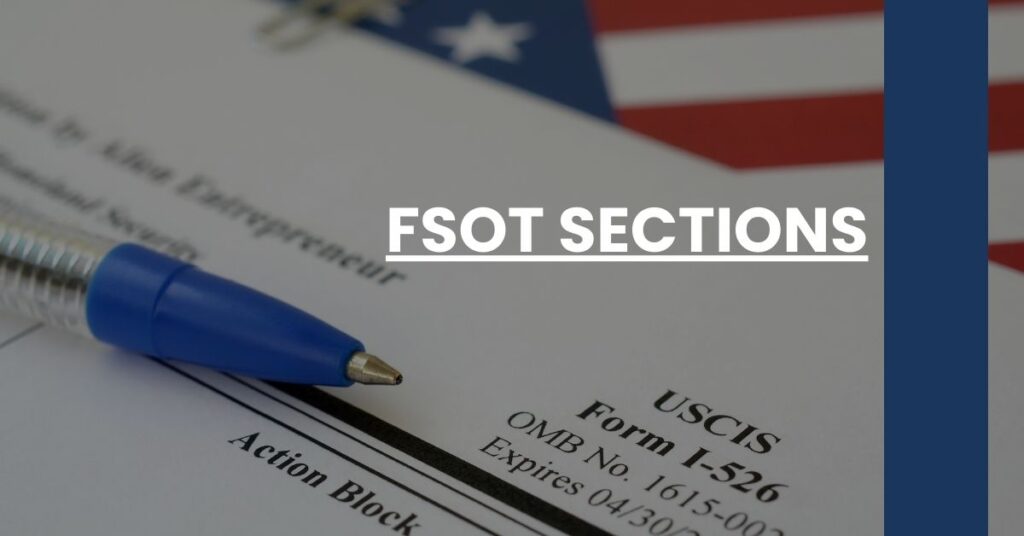The FSOT is broken down into four key sections: Job Knowledge, English Expression and Usage, Situational Judgement Test, and the Essay. Each part evaluates essential skills needed for a Foreign Service career, from comprehensive knowledge in U.S. and world affairs to the ability to articulate ideas clearly and make sound judgments.
In this article, you’ll learn:
- What topics and skills are covered in each FSOT section
- How your responses are evaluated and scored
- Effective preparation tips for each area of the test
Armed with this focused guidance, you’ll be ready to tackle the FSOT with confidence and advance towards your goal of becoming a Foreign Service Officer.
- Introduction to the FSOT
- Overview of FSOT Structure
- Section One: Job Knowledge
- Section Two: English Expression and Usage
- Section Three: Situational Judgement Test
- Section Four: Biographic Information Questionnaire
- FSOT Essay Writing Section
- The Scoring Process and Passing Criteria
- Preparing for the FSOT: Study Tips and Resources
- Conclusion: Next Steps After the FSOT
Introduction to the FSOT
The Foreign Service Officer Test (FSOT) is your first and one of the most crucial steps towards embarking on the exhilarating career path of a U.S. Foreign Service Officer (FSO). Wielding the responsibility of representing America’s interests and citizens abroad, FSOT is the hurdle that ensures only the most well-prepared, knowledgeable, and adept individuals join the ranks. This comprehensive examination is both diversified and intricate, designed to assess your knowledge, skillset, and potential to thrive in the challenging and dynamic world of foreign affairs.
Overview of FSOT Structure
At the heart of the FSOT are sections meticulously crafted to gauge a broad spectrum of abilities. You will journey through four distinct segments: Job Knowledge, English Expression and Usage, Situational Judgement Test, and an Essay portion. Each section is timed and collectively, they form a rigorous assessment of your readiness for Foreign Service. Navigating through these fsot sections requires not only academic proficiency but also sharp critical-thinking and decision-making skills wrapped in a bow of impeccable communication capabilities.
Section One: Job Knowledge
Here’s where you’ll showcase the breadth and depth of your understanding across various domains pertinent to international relations and global affairs. Spanning topics from U.S. Government to World History and Economics, the Job Knowledge section is akin to a vigilant gatekeeper, challenging you to demonstrate expertise across:
- U.S. and World History: Understanding the events that have shaped the world and US interaction with it.
- Political Science: Grasping the complex dynamics within national and global politics.
- Geography: Navigating geopolitical constellations and environmental issues.
You may be wondering, “How can I absorb such a wide array of information?” A strategic approach involves connecting current events with historical contexts, which deepens your understanding. Engage with diverse resources such as the FSOT Study Guide that provides a comprehensive overview of the kind of knowledge needed for this section. Remember, it’s not just about memorizing facts; it’s about understanding how the dots connect in the grand tapestry of global affairs.
Section Two: English Expression and Usage
This section examines your command of the English language, a vital tool in the FSO’s arsenal. You will be tested on grammar, composition, reading comprehension, and more. Why is this crucial? Your role as an FSO often involves drafting reports, articulating policy positions, and engaging in public diplomacy. Here, precision in language is not merely appreciated but expected.
Develop a disciplined writing routine; dissect articles from esteemed publications, scrutinize your grammar, and expose yourself to a variety of writing styles. This isn’t merely about avoiding grammatical errors—it’s about mastering the nuances that make your communication clear and potent. Resources from the SAT Writing Course can be instrumental in honing these skills to a fine edge.
Section Three: Situational Judgement Test
The Situational Judgement Test invites you into a realm of hypothetical scenarios where your problem-solving prowess and ethical reasoning take center stage. Here, you’ll encounter a series of situations that diplomats might face, and you’ll be tasked with choosing the most effective course of action from multiple options.
Why is this section imperative? As an FSO, you’ll often find yourself in complex situations where the pathway isn’t clearly marked. Your ability to assess scenarios, weigh the consequences of potential actions, and make informed decisions underpins your effectiveness in the field. Tap into resources like the guidance on how to pass the FSOT Situational Judgment section to get your bearings. Engage with these scenarios not just with logic, but consider the ethical dimensions that are central to the role of an FSO.
As you peer into the kaleidoscope of these fsot sections, remember that your journey is one of both depth and breadth. Mastery in each part is a stepping stone towards representing your nation with integrity and skill on the international stage. Now, let’s delve into the nuances of the Biographic Information Questionnaire — the canvas where you’ll sketch your personal and professional experiences.
Section Four: Biographic Information Questionnaire
In the true sense of introspection, the Biographic Information Questionnaire is your opportunity to present a narrative of your experiences, skillsets, and competencies. This section asks you to reflect upon your past through assorted questions that may relate to your work history, volunteer experiences, management capabilities, and much more.
Why does this section warrant your attention? Well, as a representative of the U.S. abroad, your background and how you have handled various challenges speak volumes about your potential in the diplomatic corps. Your responses should epitomize not only what you have done but also how those experiences have shaped you into a candidate befitting the Foreign Service.
You won’t find standard multiple-choice questions here – this is about your life journey. The Selection Process Information Guide provided by the State Department is a strategic resource to help you understand what the questionnaire seeks. Be thorough, be authentic, and remember to tie your experiences to the pivotal qualities essential for an FSO.
FSOT Essay Writing Section
Advancing to the FSOT Essay section, you’ll face a unique challenge: crafting an essay that’s not merely coherent, but compelling and reflective of your analytical acumen. Here, you’re provided a prompt, and you must write an essay that articulates a clear, concise argument.
Your writing will be scrutinized for comprehension, organization, clarity, and reasoning. Imagine yourself in a conference, presenting policy recommendations; your essay should mirror the clarity and conviction you would bring to such a scenario. This isn’t simply a test of verbose strength but a testament to your ability to communicate with intention and impact.
How do you prepare to make your mark? Practice with resources like the FSO Compass essay simulator to adapt to different prompts and time constraints. Learn from essay guides like those on CliffsNotes, which provide valuable insights into writing under pressure.
The Scoring Process and Passing Criteria
Your journey through the fsot sections has been rigorous. But how is this all measured? Understanding the scoring process is pivotal to your test strategy. Each part of the FSOT contributes to an overall score, which determines whether you proceed to the next stages.
A passing score incorporates the cumulative weight of each section along with a minimum threshold required for the essay. It’s not enough to excel in one area – you must demonstrate consistent strength across all aspects of the test.
Preparing for the FSOT: Study Tips and Resources
Preparing for the FSOT is like gearing up for a diplomatic mission – it requires a blend of strategy, knowledge, and poise. Here are some concise tips for each FSOT section:
- Job Knowledge: Create a study plan that encompasses current events, history, culture, and government. Utilize academic textbooks as well as the FSOT Job Knowledge Practice to test your scope.
- English Expression and Usage: Read widely, practice grammar exercises, and write regularly. Tools like the SAT Writing Course can sharpen your technical skills.
- Situational Judgement Test: Place yourself in the shoes of a diplomat by reviewing case studies and applying ethical decision-making to practice scenarios available through various study guides.
- Essay Writing: Timing is key, so practice outlining and drafting essays within the time limit. Resources like CliffsNotes can offer strategic essay writing frameworks.
Conclusion: Next Steps After the FSOT
As we wrap up our extensive look into the FSOT sections, remember that this test is more than an examination; it is a reflection of your potential to represent and serve your country. If you’ve found this guide enlightening, let it serve as your compass through the intricate landscape of the FSOT. Now, armed with detailed insights and a well-articulated strategy, you’re prepared to approach the fsot sections not with trepidation but with confidence and clarity.
Take this information, immerse yourself in preparation, and when the date of your test arrives, step forward with the assurance that you are equipped to excel and move closer to the esteemed role of a Foreign Service Officer. The journey that awaits beyond the FSOT promises a career of unparalleled impact and adventure – embrace it with the meticulous preparation that starts with mastering the FSOT sections.
FSOT sections explained: Master the Foreign Service Officer Test layout, subjects, essays, and scoring with this essential guide.

